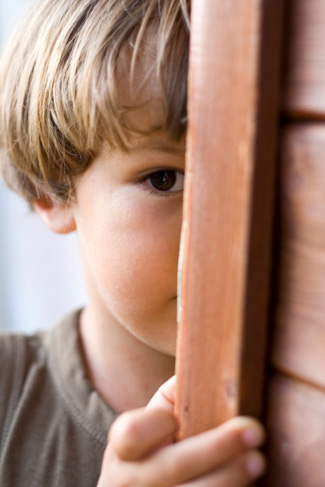Parenting advice to help shyer, sensitive, timid kids feel more comfortable and gain confidence in social situations

“You go ahead without me.”
“I’m afraid to raise my hand.”
“I’d rather be by myself.”
“Please don’t make me go!”
Let’s face it: watching a shy, timid or hesitant child can be painful. They hang back, look uncomfortable or tense, cry or cling to their parents. Kids who hang back and are shy are often handicapped from experiencing life to its fullest. Shy children often curtail their experiences and don’t take the necessary social risks, and as a result don’t gain confidence in social situations. Not being able to join a group and make new friends will haunt them the rest of their lives. Finally, the pain of social rejection will set in.
The good news is that research shows we can help kids feel more comfortable in groups and reduce their fears in the ways we respond and the skills we teach. In fact, studies have shown that about 90 percent of all anxious kids can be greatly helped by learning coping skills.
Here are some of the effective proven ways to help your shyer child feel less tense and more comfortable in social settings so she or he enjoys life fuller and gains social competence.
Helping shy kids feel comfortable socially
1. Accept your child’s natural temperament
This isn’t about changing your introvert into a social butterfly. Don’t even try. Shyer children generally need: structure, less pushy parents, time to warm up, understanding and sensitivity, calm, less intense adults, quiet discipline that preserves their dignity.
Your key question: “What are you doing to tailor your parenting to your child’s natural shy tendencies?”
2. Check your expectations
While shyness is largely genetic, your parenting style can help your child “outgrow” their more hesitant, anxious social tendencies.
The renown Harvard child psychologist, Jerome Kagan conducted a 20-year study and found that one in three shy children did climb out of their shells. Those who did usually had a parent who refused to overprotect their shy child, served as a role model for social skills and coached their child on how to interact with peers.
3. Create a tension scale
Shyer children often have a hard time verbalizing their concerns. So try creating a Tension Scale from one to ten. A younger child can call it a “Fear Thermometer.” “One is no tension. You feel calm and confident. Ten is when you feel extreme tense about the situation real heart palpitations, fear factor, pain, immobilized.” When you see your child’s shy signs flare up and you know that she feels uncomfortable and tense, ask: “How bad is your fear on a scale of one to ten?”
4. Emphasize prior success
It’s natural for a shy child to focus on past failures. So help her recall previous experiences when things went really well.
“Remember last year’s swimming lessons? You begged not to go, but did and met a new friend.”
“Before you went to Sara’s party you wanted to stay home also. But when you agreed to stay at least a half an hour and you ended up one of the last ones to leave.”
5. Schedule warm up time
Some kids take longer to warm up in a social setting, so give your child time to settle in. Go early when there might not be such a noisy crowd. Be patient and don’t push too quickly. When your child is ready encourage her to walk in the direction of one child (not a huge group) or one activity that she can do (the puzzle, the marbles game, the balance beam, whatever!) Anxiety builds by just staying in one place.
6. Reinforce any social efforts
Any and every effort your child makes to be even a tad more social deserves a pat on the back: “I saw how you walked up to that new boy today. Good for you!” “I noticed that you really made an effort to say hello to Sheila’s mom. She looked so pleased!”
7. Practice skills with younger peers
Stanford University studies found thatpairing older kids with younger children for brief periods is a proven way to help the older child try out new social skills that he may feel uncomfortable about with friends his own age.
8. Make one-to-one playdates
Research finds that one of the best ways to help shyer kids gain social confidence is with “one-on-one play dates.” Many kids can be overwhelmed in groups, so limit the number of friends to one at a time. Then gradually increase the number as she gains confidence.
9. Reinforce smiling!
One of the most common traits of confident, well-liked kids is that they smile and smile. So whenever your child displays a smile, reinforce it: “What a great smile!” and point out how your child’s smile effects others: “Do see how kids smile back when you smile?”
Above all, accept, love and enjoy your child for who he or she is.
Dr. Michele Borba, Parenting Expert
Follow me on twitter @MicheleBorba or on my daily blog Dr. Borba’s Reality Check.
For more strategies to help boost children’s social competence refer to my book, The Big Book of Parenting Solutions: 101 Answers to Your Everyday Challenges and Wildest Worries in the chapters Shy, Sensitive, Bad Friends, Bullied, Bullying, Cliques, Friend Breakups, Peer Pressure, Rejected or my book Nobody Likes Me: Everybody Hates Me – 25 Top Friendship Problems and How to Solve Them.

